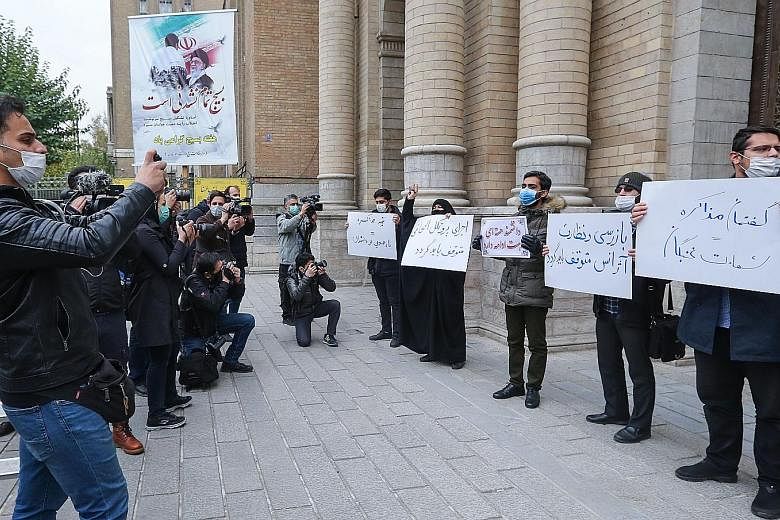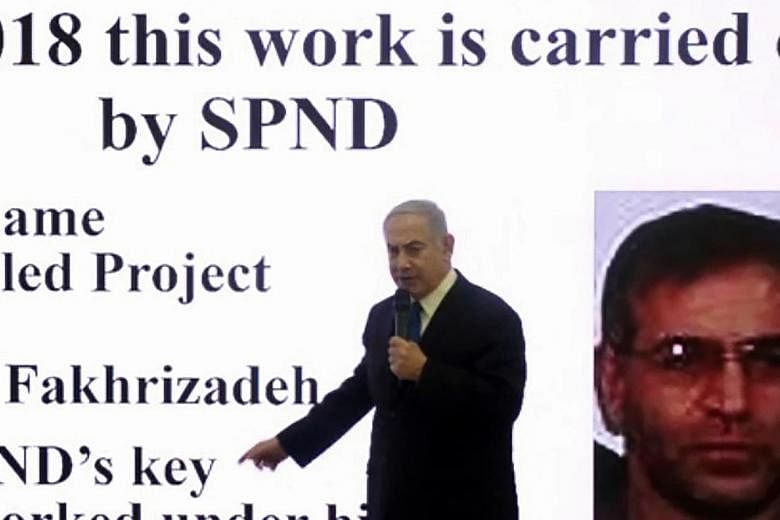TEHERAN • Iran accused Israel and the United States of being behind the assassination of its top nuclear scientist Mohsen Fakhrizadeh on Friday and vowed revenge, sharply escalating tensions in the Persian Gulf in the final weeks of Donald Trump's US presidency.
Dr Fakhrizadeh was the head of research and innovation at Iran's Ministry of Defence and widely seen as having a major role in the country's nuclear programme. He was killed close to the Damavand campus of Islamic Azad University, about 60km east of central Teheran, the semi-official Tasnim news agency reported.
Yesterday, Iran's Supreme Leader Ayatollah Ali Khamenei on his Twitter feed promised retaliation for Dr Fakhrizadeh's assassination and said his nuclear work would continue.
President Hassan Rouhani called the killing an "act of terrorism" carried out by the "mercenary Israel regime", according to a statement published on his official news portal yesterday.
"Terrorists murdered an eminent Iranian scientist today. This cowardice - with serious indications of Israeli role - shows desperate warmongering of perpetrators," Foreign Minister Mohammad Javad Zarif said in a tweet, without offering any evidence for Israel's involvement.
Minister of Defence Amir Hatami told state TV the killing was "clearly linked" to the US assassination of General Qassem Soleimani by drone in January.
"Our enemies are having a stressful few weeks," Mr Rouhani said on state television. "The era of their pressure is waning as global circumstances are changing. It's important for them to make the most of the next few weeks."
The deputy leader of Lebanon's Iran-backed Hizbollah movement, Sheikh Naim Qassem, also accused the US and Israel of sponsoring the assassination.
The office of Israeli Prime Minister Benjamin Netanyahu declined to comment, as did Pentagon officials. But former director of the US Central Intelligence Agency John Brennan said on Twitter that he did not know if a foreign government had authorised or carried out the murder but "such an act of state-sponsored terrorism would be a flagrant violation of international law & encourage more governments to carry out lethal attacks against foreign officials".
Mr Brennan noted that Dr Fakhrizadeh was neither a designated terrorist nor a member of Al-Qaeda or the Islamic State group, designated terror groups which would be legal targets.
US news website Axios reported this week that Israel's government had instructed the military to prepare for a possible US strike against Iran during the remainder of Mr Trump's term, though it said the order wasn't based on intelligence or an assessment that the US would order an attack.
Mr Trump re-tweeted a news report on Dr Fakhrizadeh's killing without comment, and a tweet by an Israeli journalist who called the killing "a major psychological and professional blow for Iran".
Teheran has blamed the spy agencies of Israel and the US for the killing of four other Iranian nuclear scientists since 2010.
Dr Fakhrizadeh's assassination could trigger the sort of popular anger that followed the killing of Mr Soleimani in a drone strike in Baghdad ordered by Mr Trump. Iran fired missiles at bases housing US troops in Iraq in response to that attack, causing no fatalities but raising fears of a slide to war between the two adversaries.
BLOOMBERG, REUTERS


